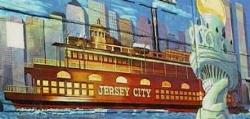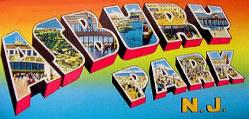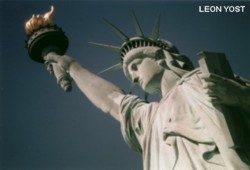 |  |  |
|
| ||
 |  |  |
 |  |  |
|
| ||
 |  |  |
|
|
Originally appeared in The New York Times on Saturday, March 24, 2001,
By DAVID M. HALBFINGER
After enduring weeks of critical news coverage of his past financial dealings, Acting Gov. Donald T. DiFrancesco released a stack of public and private documents late today. They range from his tax returns for the past seven years to a 1992 police report on a fatal auto accident in which a car in which he was riding struck and killed a pedestrian.
Mr. DiFrancesco, who is also the leading Republican contender in the June primary for governor, called it the "most comprehensive and complete disclosure ever" by a New Jersey candidate, and pleaded with his electoral rivals and the news media to "leave the politics of personal destruction behind, and get on with the issues that really matter to people."
"I encourage everyone, candidates and the media alike, to help us raise the tenor of this campaign and focus on the issues," Mr. DiFrancesco said in a statement accompanying the documents, which were distributed to reporters here shortly after 4 p.m. "It's time to move on and focus on the real differences between the candidates and end this gotcha politics and journalism."
The timing of his release appeared to follow a classic political strategy in which officials put out information they want to be ignored late on a Friday, in the belief that Saturday newspapers have the smallest readership.
The release was an extraordinary move for a politician in an extraordinary situation: after 25 years in the relative obscurity of the Legislature, Mr. DiFrancesco ascended to the all-powerful governor's office on Feb. 1 without ever having undergone the heightened scrutiny of a statewide campaign. Suddenly, he became an incumbent, but one essentially unknown to the public, setting off what Mr. DiFrancesco's allies have likened to a journalistic scavenger hunt, and others have called a natural, if compressed, vetting process. Moreover, he is a candidate for the office he holds, with two rivals eager to lay their hands on anything that would give them an advantage.
The two-inch-thick packet delivered by Mr. DiFrancesco's official state spokesman included his state and federal tax returns for the years 1994 through 2000, when he and his wife earned an average of $486,000 a year; his voting record since 1966 in his hometown, Scotch Plains, N.J.; lists of payments of property taxes on his home, his shore house and four other properties he and his wife own; a summary of litigation dating back to 1988 in which Mr. DiFrancesco was named as a defendant; and a listing of the public-sector clients of his former law firm, and the amounts they were billed annually from 1994 through 2000.
Mr. DiFrancesco described the papers as "everything that I know has been requested by my opponents' opposition researchers as well as the press," without naming those rivals: Bret D. Schundler, the conservative Jersey City mayor challenging him in the Republican primary, and James E. McGreevey, the Democratic mayor of Woodbridge, who awaits in November.
His move appeared likely to raise as many questions as it answered, however. In particular, by choosing to provide tax returns and law-firm billings only as far back as 1994, Mr. DiFrancesco made it impossible to determine how much his heightened influence as president of the state Senate beginning in January 1992 might have increased his earnings and his value to his firm as a source of new public-sector clients.
"It's still not the full story," said Richard McGrath, spokesman for Mr. McGreevey, who last month released his own tax returns dating back to 1992, the year he became mayor. "We're glad he finally decided to follow our lead, but full disclosure and true accountability should reach back to the years prior to him becoming Senate president."
Mr. Schundler, who also has provided tax returns since 1992, his first year in office, took a similar swipe at Mr. DiFrancesco, but a backhanded one. "While the courageous thing for Don to do would have been to present a complete picture of his personal finances," he said in a statement, "I am heartened that the acting governor has decided to end the negative campaign, and I look forward to him joining me now in a spirited and vigorous discussion of the real issues that matter to New Jersey."
Mr. Schundler called on Mr. DiFrancesco to agree to four debates in the coming weeks "so that New Jerseyans can see and hear for themselves what we think of the issues before us."
Tom Wilson, Mr. DiFrancesco's spokesman, said the acting governor had intended to divulge only five years of tax returns until news accounts raised questions about two financial transactions in which Mr. DiFrancesco received monetary help from friends or companies doing business with the state.
In the earlier of the two deals, in 1994, Mr. DiFrancesco borrowed $575,000 from four friends to settle with a bank after he and his older brother defaulted on $1.2 million in loans. Mr. DiFrancesco's tax returns for 1994 and 1995 showed he paid a total of $19,607 in interest on the loans to those friends: Pamela Coley, the wife of John E. Coley Jr., a law partner; an uncle, Mauro Checchio; and Anthony J. Sartor and M. Joseph Montuoro, both of whom were then and are now appointees to state commissions.
The second transaction reported recently, a $225,000 payment from the state's largest home builder, the K. Hovnanian Companies, which Mr. DiFrancesco used to satisfy a legal judgment in 1996, was not referred to in his tax returns. Mr. Wilson said that the money was not income because it came to Mr. DiFrancesco in the form of a loan from Mr. Coley, his law partner, who was then repaid by Mr. DiFrancesco's brother and cousin, who in turn received the money directly from Hovnanian.
"Seven years is what the I.R.S. requires you to keep," Mr. Wilson added. "If seven years is enough for the I.R.S., it ought to be enough for anyone who has an ounce of common sense."
A cursory review of Mr. DiFrancesco's tax returns for those seven years show he and his wife, Diane, reported adjusted gross income ranging from a high of $576,370 in 1997 to a low of $430,501 the next year. They paid an average of $139,000 in federal taxes yearly, for an effective tax rate of 28.6 percent.
Mr. Coley, Mr. DiFrancesco's law partner, also played a key role in the 1992 car accident, in which a pedestrian, Stephen C. Wilczak, 77, of Warren, was killed. Mr. Wilson said Mr. Coley was driving Mr. DiFrancesco and their wives to a pizzeria the day after Christmas. He said Mr. Wilczak was crossing the street to get his mail when he lurched to avoid a passing car, but stepped into the path of Mr. Coley's car. No charges were filed, according to the police report.
 Your Ancestors' Story |
 Bruce Springsteen's Jersey Shore Rock Haven! |

|
UrbanTimes.com |